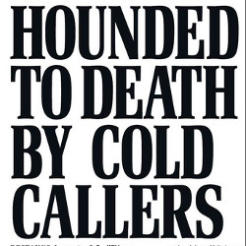The charity sector has been accused of hounding a 92-year-old woman to death with a barrage of fundraising letters and phone calls.
Retired poppy seller Olive Cooke received up to 260 fundraising letters a month and so many fundraising phone calls that she no longer picked up the phone to friends and family, according to newspapers including the Daily Mail, Mirror and Metro. She apparently jumped to her death from the Avon Gorge bridge in Bristol last week.
In an interview with the Bristol Post before her death, Cooke said that she "couldn’t say no" to fundraising appeals and felt "overwhelmed" by the volume.
“I believe some of the charities must have passed my details on, as I then started getting letters from other similar causes,” she said.
She told the newspaper she felt she was being targeted because she was elderly and might have money to spare.
According to newspaper reports, Cooke received letters from the Alzheimer's Society, Save the Children, Battersea Dogs and Cats Home and Mind, among others, and spent an afternoon each week sorting through the letters.
'Felt guilty'
Friend Michael Earley told BBC Radio Bristol: “She felt she had given so much and she couldn't give any more. The phone calls were terrible. She felt guilty. They had a bearing on her death.”
LBC Radio devoted most of its 11am show this morning to the story, asking listeners to discuss whether fundraisers working on behalf of “noble charitable causes” had reached the point where their tactics were “doing more harm than good”.
Listeners responded with their own tales of being door-knocked late at night, their children sent direct mail containing disturbing images, and street fundraisers that wouldn’t take no for an answer.
This attack on charity fundraising is the latest in a line of media scrutinies. Last year a Channel 4 Dispatches programme alleged that telephone fundraisers were urged to lie to boost donations. The programme led to calls for more transparency about how fundraising companies work with charities.
Peter Lewis, chief executive of the Institute of Fundraising, said people in a similar situation to Olive Cooke “simply need to let the charity know”.
“All members of the Institute of Fundraising sign up to the Code of Fundraising Practice which sets the standards for all forms of fundraising,” he said in a statement.
“It is absolutely clear in our code that if an individual no longer wants to receive communications from a charity, in whatever form, they simply need to let the charity know. If the charity then continues to contact the member of the public it is a breach of our code, and the person can take their complaint to the Fundraising Standards Board, who will investigate and if needs be adjudicate against the charity.
“Olive was clearly an incredibly generous supporter of charities both in terms of her donations and as a fundraiser with the Poppy Appeal and we extend our deepest condolences to her friends and family.”
'Last thing that charities would want'
Alistair McLean, chief executive of the Fundraising Standards Board (FRSB) described Cooke’s death as a “tragedy”.
“The last thing that charities would want to do is to cause distress to the public when they fundraise,” he said.
“There are clear and high standards for charity fundraising in the UK, set out in the Institute of Fundraising’s Code of Fundraising Practice, which cover the requirement not to pressurise the public and reinforce data protection requirements.
“The Code also makes it clear that charities need to be mindful of how they fundraise amongst people who may be in vulnerable circumstances and that organisations need to respect donor’s requests around the frequency with which they can be contacted.”
McLean urged recipients of direct marketing to “get in touch” with the relevant charities if unhappy.
“They will listen and respect your views, and your feedback can influence how they do things in the future. Public feedback is vital to help identify and resolve any such issues,” he said.
In a statement this morning, FRSB said donors can take steps to reduce the volume of charity asks – including signing up to the Telephone Preference Service and Mailing Preference Service - and watching out for tick boxes on donation forms to opt out of unwanted contact.
Cooke was the UK’s longest serving poppy seller. She began in 1938, aged 16, and pledged to continue every year after the death of her husband in 1943. Last year she was given the Points of Light award by Prime Minister David Cameron, in recognition of her "outstanding" work in helping others.










